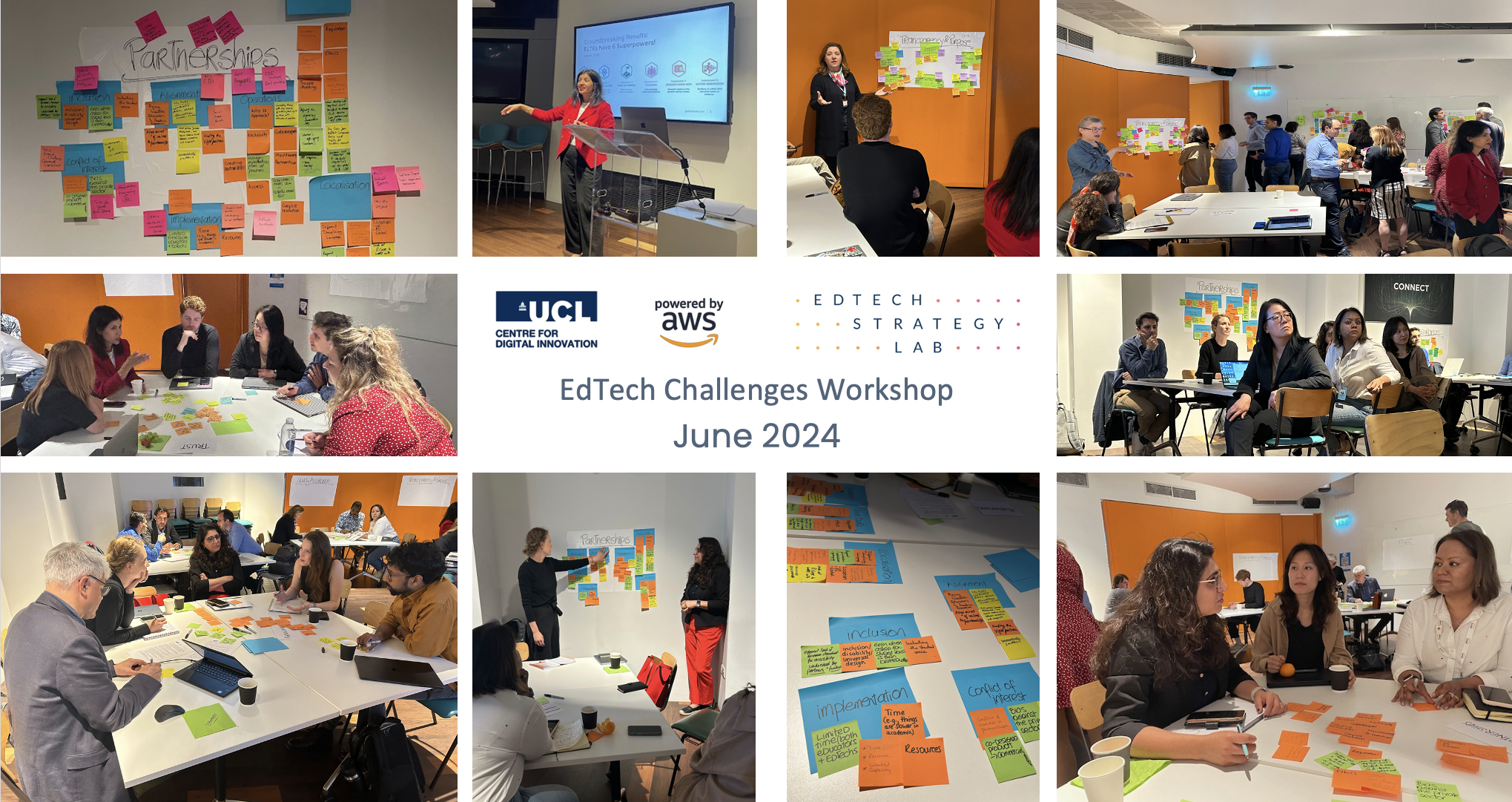EdTech Innovation Workshop at UCL
Subjectivity, Cultural Considerations, and Divergent Goals as Overlapping Challenges
The fourth in-person workshop of the EdTech Strategy Labs was conducted in cooperation with the UCL Centre for Digital Innovation Challenges on 18 June 2024, in London. The UCL Centre for Digital Innovation Challenges is a year-long initiative with the aim of identifying and better understanding real-world, user-driven challenges in the adoption of digital innovations across healthcare and education.
The primary objective of this half-day workshop was to encourage participants to think critically about the challenges related to evidence, trust, partnerships, purpose, transparency, and quality assurance in EdTech, while also showcasing existing work addressing these issues.
With support from several ecosystem partners - including the UCL Institute of Education, UCL Knowledge Lab, Amazon Web Services, the European EdTech Alliance, and the Jacobs Foundation - the four-hour workshop brought together around 20 researchers.
Many of the challenges discussed in the topic-related group sessions overlapped across the five broader themes. A key insight was the difficulty in defining concepts such as “trust”, “evidence”, and “quality” due to their subjective nature and varying needs depending on the user.
Professor Manolis Mavrikis from UCL Knowledge Lab summarised the discussions on his table by stating:
“Quality is very subjective to the eye of the beholder.”
Culture also plays a significant role in how trust is established and how partnerships are approached and maintained. Dr. Neelam Palmer, Director of Digital Learning and Education at AISL Harrow Schools in Asia, emphasised this point:
“While the partnerships here have certain cultural connotations, if you pick up that bag into Asia it doesn’t work the same.”
Another challenge common to all topics is making certain aspects more visible to different audiences. This includes increasing transparency, promoting open data, and communicating information in a way that informs decision-making. Additionally, it is crucial to clarify who the generated evidence is for and to contextualise it for different types of schools.
Michael Forshaw, CEO at EdTech Impact, questioned:
“Who is the evidence for? Is it aimed at researchers? Founders? Schools? Parents? Investors? Or policymakers?”
A significant challenge identified was the tension between different goals, such as the claim that transparency in EdTech is unachievable.
Graca Carvalho, Centre Director of UCL Centre for Digital Innovation explained:
“Achieving transparency is a utopia because of the tension between being vulnerable and truly transparent with your data and avoiding losing your investors and market”
Regarding quality assurance, there is a tension between the need for a regulatory framework and the risk of stifling innovation. Another challenge is the differing operational speeds of various stakeholders, with academics typically moving slowly while EdTech companies move quickly.
The exercise to clarify challenges was followed by a round of solutions showcasing by some participants. This included approaches like UCL EdTech Labs’ method of converting founders’ underlying assumptions into testable hypotheses for impact, AWS’ efforts to provide a secure and robust platform to address trust-related challenges, and general support measures for EdTech organisations. Michael Forshaw highlighted EdTech Impact’s marketplace platform, which enables educators to review tools and provide feedback.
Alison Clark-Wilson explained how the Global EdTech Testbed Network (GETN) developed a framework, designed to help countries adopt systemic testbeds that allow EdTech organisations to test their solutions in real-world settings.
This workshop underscored the importance of considering subjectivity, cultural differences, and the need for clear communication in addressing EdTech challenges, while also highlighting innovative solutions already making strides in the field.

